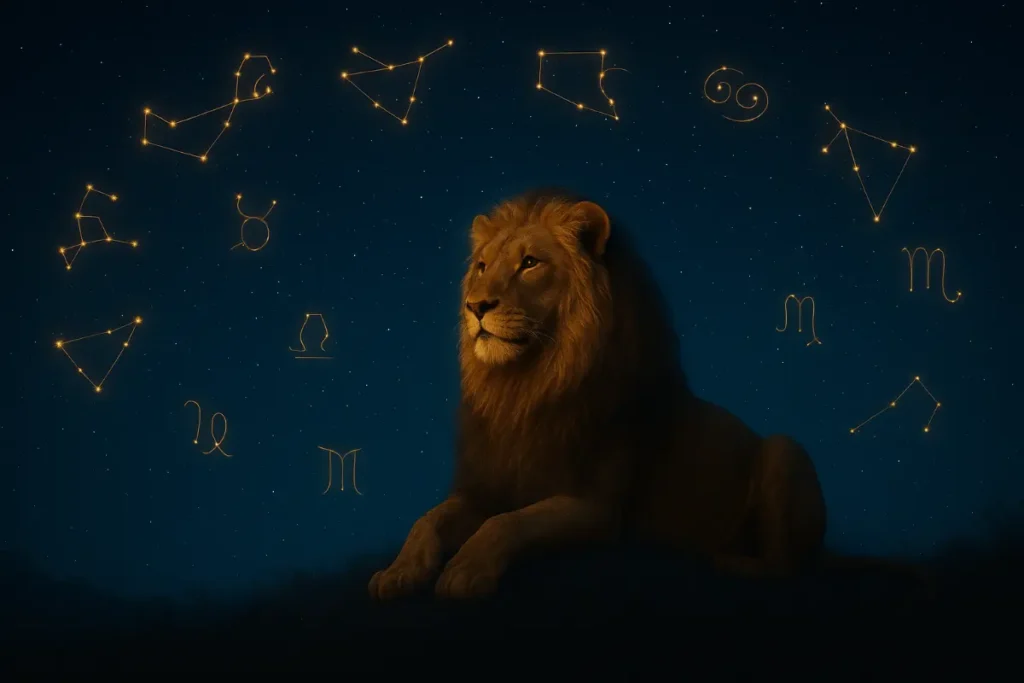🧭The Dawn of AI in Ancient Wisdom
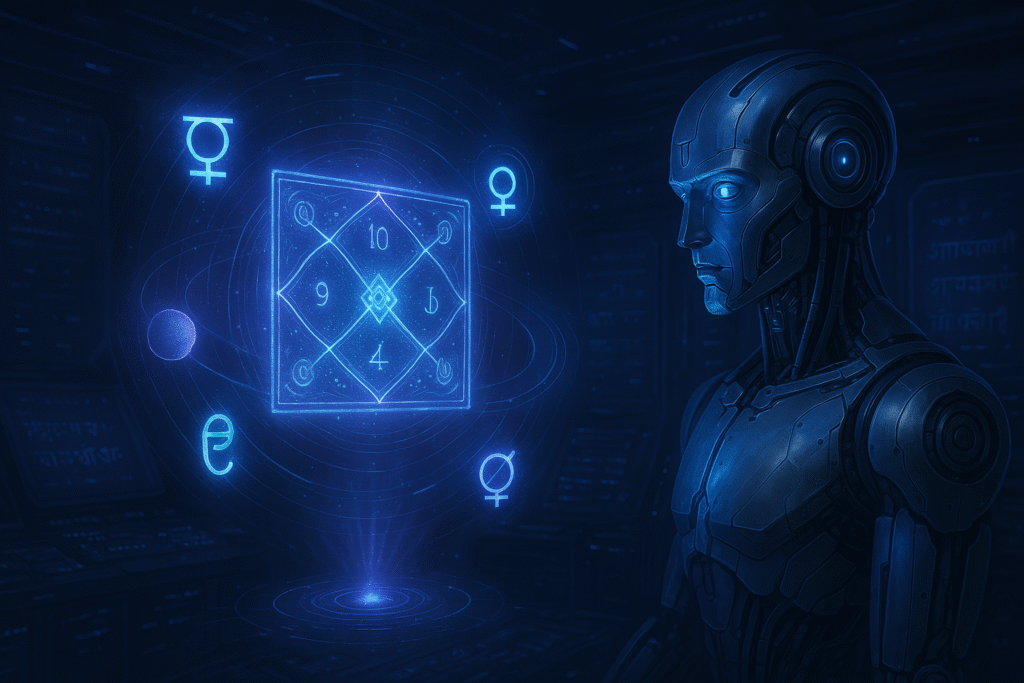
In a world driven by innovation, ancient Vedic astrology—also known as Jyotish Shastra—is evolving through artificial intelligence. Imagine an app alerting you of upcoming planetary danger zones based on your birth chart and transits. This is no longer a dream but reality. From AI-powered Vedic warnings to personalized astrological guidance, technology now intersects with the divine in real-life applications.
One remarkable case: Paytm CEO Vijay Shekhar Sharma shared an AI-based astrological alert predicting heightened air travel risk arising from specific planetary configurations. This sparked public attention and validated AI’s potential to act as a modern digital seer. According to the Economic Times, his alert was rooted in an AI analysis of Rahu in Pisces, Saturn retrograde, and a sensitive Mars transit, coinciding with actual aviation incidents around 2025.
This intersection of millennia‑old wisdom and modern technology marks a turning point. In this blog, we explore:
- What exactly is an AI‑powered astrological warning?
- How modern apps integrate AI with Jyotish systems.
- Real world use cases across health, career, relationships.
- Ethics, limitations, and authenticity concerns.
- What the future holds when machines meet consciousness.
🔮Understanding AI‑Powered Vedic Warnings
What is a Vedic Warning?
A Vedic warning is an astrological alert based on transits, Dasha (planetary periods), and décans. Traditionally issued by human astrologers, these warnings alert individuals to karmic challenges: major delays, health risks, travel danger zones, or emotional upsets.
How AI Enables These Warnings
- AI systems ingest vast datasets—hundreds of thousands of natal charts correlated with life events.
- Pattern recognition via machine learning enables detection of planetary configurations previously overlooked.
- The system generates alerts such as: “Saturn Dasha activating in 7 days; expect career tension and travel delays.”
One notable case is the AI-generated alert issued by Paytm’s CEO, who publicly shared his horoscope-based warning through social platforms . This event emphasizes how AI can operationalize Jyotish forecasts in real time.
Key Elements in AI Warnings:
- Transit flags for malefic combinations (e.g., Sun-Saturn, Mars-Rahu).
- Dasha phases mapped to historical outcomes.
- Remedial suggestions like mantras, donations, fasts, matching Vosha Puja schedules.
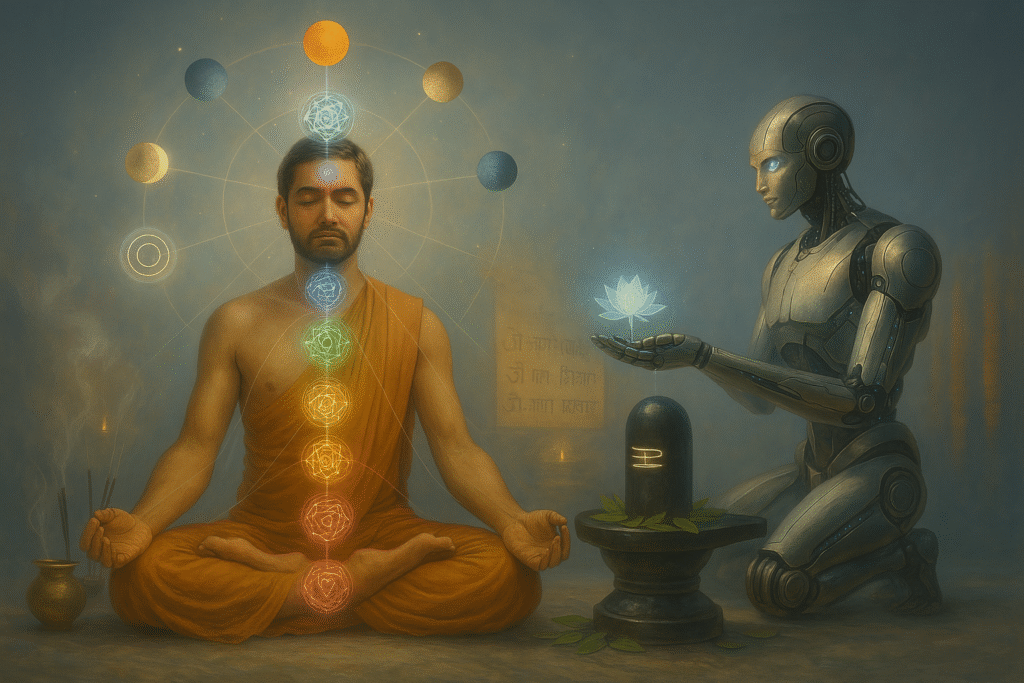
🏛️ Cultural Impact: How India Embraces & Debates AI + Astrology
In India, Vedic astrology, or Jyotish Shastra, is more than a belief system—it is an integral part of everyday life. From marriage matching to health predictions and muhurta (auspicious timing), astrology guides millions in making key decisions. The rise of AI-powered astrology has sparked both enthusiasm and skepticism across society.
When Paytm CEO Vijay Shekhar Sharma publicly shared an AI-driven Vedic astrology warning—predicting heightened air travel risk due to Rahu transiting Pisces and Saturn retrograde—it stirred widespread attention. Many hailed the move as a fascinating blend of tradition and innovation. Others, however, raised concerns about whether “digital superstition” might replace thoughtful decision-making.
Indian media outlets such as NDTV, Economic Times, and The Hindu debated this new trend, with headlines such as “Mixing AI and Destiny: Future of Jyotish or Modern Folklore?” Urban millennials, who might have previously been skeptical about astrology, are now engaging with it via apps and data-driven dashboards. The accessibility of spiritual technology appeals to tech-savvy users who value personalization, analytics, and real-time alerts.
However, religious leaders and traditional astrologers urge caution. They advocate for a balanced approach—recognizing the value of AI tools but emphasizing the irreplaceable intuition and experience of human astrologers. In this culturally rich landscape, AI-powered astrology doesn’t aim to replace age-old wisdom but to support it with precision and predictive insights.
🛠️How AI Transforms Astrology Platforms
AI in Popular Astrology & Devotional Apps
Several astrological and deity worship platforms now integrate AI capabilities:
- Vaya, which recently raised $1.5M in seed funding, offers AI-driven birth chart interpretation paired with vetted astrologer consultation .
- AppsForBharat, Utsav, and Align27 utilize AI for devotional guidance, matchmaking priests, and automating chant translations .
- AstroSage AI provides instant Kundli generation, real-time transit analysis, and generative horoscope descriptions powered by NLP .
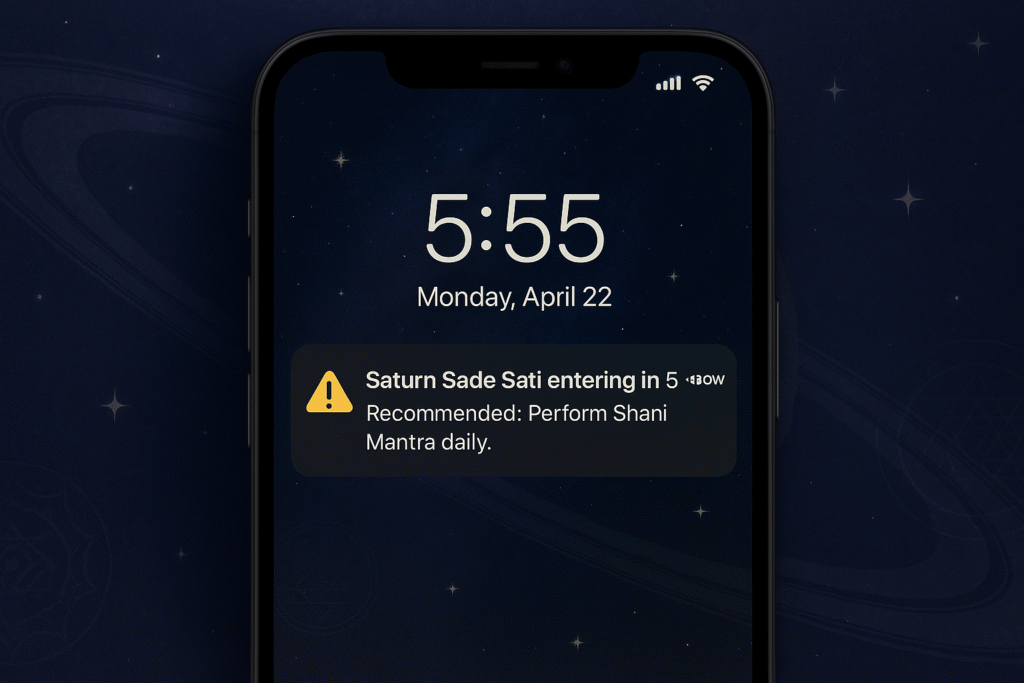
AI Features at a Glance:
| Feature | Benefit to User |
| Instant chart generation | Delivers quick, accurate birth chart reading |
| Real-time transit alerts | Warns user ahead of harmful planetary moves |
| Data-backed personality traits | Based on big data aggregation of outcomes |
| Natural language horoscope | Human-like, personalized written guidance |
Real-World Scenarios:
- Air Travel Warning: AI flagged an upcoming period of Sade Sati for CEO’s chart, advising against flying.
- Health Alert: An app warns a user of potential surgeries during Saturn-Ketu periods, suggesting preventive health measures.
- Financial Forecast: AI projects capital gains blocked during Venus-Vesta alignments, recommending charity or rituals.
⚙️ How to Use AI-Powered Astrology Apps: A Practical Guide
The emergence of AI-powered astrology apps has made Jyotish accessible like never before. Apps such as AstroSage AI, Vaya, and Align27 allow users to receive real-time astrological insights, alerts, and remedies—all from their smartphones. Here’s how users can engage with these platforms effectively:
1. Download & Onboarding
- Download the app from a trusted source (Google Play or App Store).
- Input accurate birth data: date, time, and place.
- Some apps request identity verification for profile security and GDPR or PDP compliance.
2. Kundli & Transit Dashboard
- Generate a detailed birth chart (Janam Kundli) instantly.
- View real-time planetary positions, transits, and ongoing Dasha-Bhukti periods.
- Access graphical timelines for upcoming periods of risk or opportunity.
3. Alerts & AI Warnings
- Set personal thresholds for warning notifications (e.g. Mars in the 8th house).
- Receive push alerts for high-impact transits like Saturn Return, Sade Sati, or Rahu-Ketu axis shifts.
- Notifications often include Vedic explanations and suggested precautions.
4. Remedies & Personalized Insights
- Receive mantra recommendations (e.g. Maha Mrityunjaya during health risk phases).
- Donation guidance based on planetary afflictions (e.g. donate urad dal for Shani dosha).
- Opt for hybrid consultations where AI is supplemented by a human astrologer.
5. Logging & Journaling Features
- Daily mood tracking linked to lunar phases or planetary conjunctions.
- Write reflections to build personal correlations between karma and cosmic timing.
- Monthly reports that visualize life cycles and emotional energy patterns.
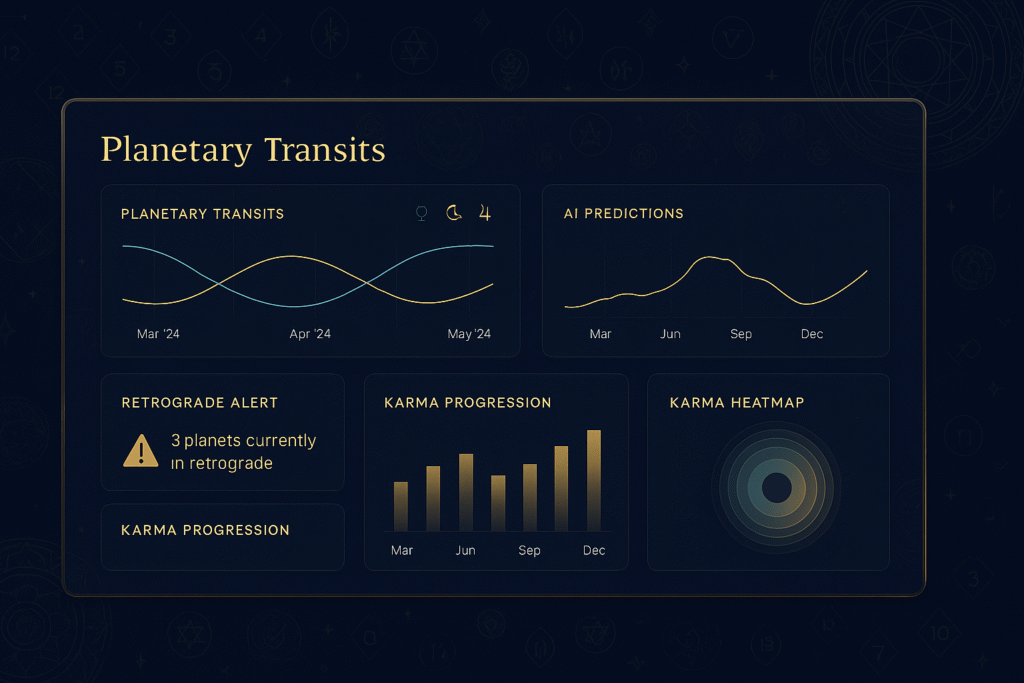
Tips for Safe Use
- Ensure your data is encrypted and stored securely.
- Avoid overdependence—AI should guide, not dictate.
- Use human astrologers for major decisions like marriage, surgery timing, or business launches.
- Regularly back up your data and ensure the app is updated with accurate ephemeris data.
These features combine convenience with depth, making ancient wisdom actionable for modern life.
🌐Real-World Use Cases of AI-Astrology Fusion
Career & Business Predictions
By analyzing the 10th House and Jupiter-Mercury transits, AI can pinpoint favorable career shifts. For example, a startup founder used AI insights that aligned with his Jupiter-Saturn success window. He adjusted launch timing and reported smoother investor meetings.
Relationship & Compatibility Insights
AI-based platforms like Clickastro integrate Kundli Gun Milan with behavioral psychology, producing compatibility scores enhanced by sentiment analysis of user profiles .
Health & Emotional Well-being
Apps analyze 6th house afflictions and dasha cycles to suggest Ayurveda and mantra remedies—like Maha Mrityunjaya or Chandramṛgayā chants before eclipses.
Muḥūrta (Timing) Planning
AI assists millions in selecting auspicious wedding or event dates by automatically cross-checking Rahu Kalam, Chaughadiya, and planetary placements.
🧠Ethical, Accuracy & Trust Issues
AI Accuracy Concerns
- Ephemeris errors: Some AI tools have placed Moon degrees incorrectly or miscalculated Nakshatra placements.
- Hallucinations in NLP: AI hallucinating false ruling planet positions has been reported on Reddit astrology forums .
Human vs. AI Debate
An article in Teen Vogue questions whether AI can truly replace astrologers, emphasizing the importance of empathy and cultural nuance in astrological interpretation .
Ethical Considerations
Is it appropriate for an AI to warn someone about travel risk or financial loss? Key concerns:
- Liability when AI gives wrong advice.
- Privacy issues in storing birth data.
- Dependency over intuitive spiritual growth.
Outdoor critics caution that platforms should provide disclaimers and human oversight. A balanced model: AI + verified astrologer verification before sending alerts.
🧾 Legal & Privacy Considerations: Trust in the AI-Astrology Space
As AI-driven astrology apps grow in popularity, important questions emerge around legality, user safety, and data privacy. Birth charts contain sensitive personal information—precise birth time, place, and even spiritual inclinations—which raises legitimate concerns over how this data is collected, stored, and used.
Leading Indian platforms such as Vaya and AppsForBharat have adopted secure data policies aligned with the proposed Personal Data Protection Bill. These platforms ensure user consent, data encryption, and limited retention periods to protect spiritual and personal information.
Still, grey areas remain. Currently, AI-generated astrological predictions do not fall under regulated professional services like finance or medicine. If an app inaccurately warns someone of travel danger or financial loss, there is little legal recourse. Disclaimers on these apps usually state that astrology is “for entertainment or spiritual use only,” thereby limiting liability.
Transparency is another key issue. Users must know how their data is being processed and whether predictions are fully AI-generated or reviewed by certified astrologers. Opt-in consent is essential, especially for sensitive services like health alerts or marriage compatibility recommendations.
Calls are growing for standardized ethical frameworks. Thought leaders in the Jyotish community have proposed digital certification for AI-based astrologers and clearer guidelines around what apps can promise. This protects both spiritual integrity and consumer trust.
As the sector matures, apps will need to walk a fine line: offering empowering guidance while maintaining ethical, legal, and data security standards.
🧘Fusion of AI Tools with Traditional Jyotish
Best Practices for Platforms
- Use AI as an initial screening to flag potential issues.
- Always offer human astrologer consultation as a follow-up.
- Provide explanatory transparency on how AI derived the warning.
Enhanced User Experience
Chatbot assistants now simulate Vedic dialogues:
- “Tell me about my Saturn Dasha.”
- “When is my next Gajakesari Yoga?”
These tools elevate Vedic astrology from mystical shadows into accessible spiritual technology.
Balancing Tradition and Tech
- Use AI for birth chart generation and basic transit reading.
- Reserve deep karmic and remedial decisions for astrologers.
- Educate users about limitations, encourage journaling and self-study.
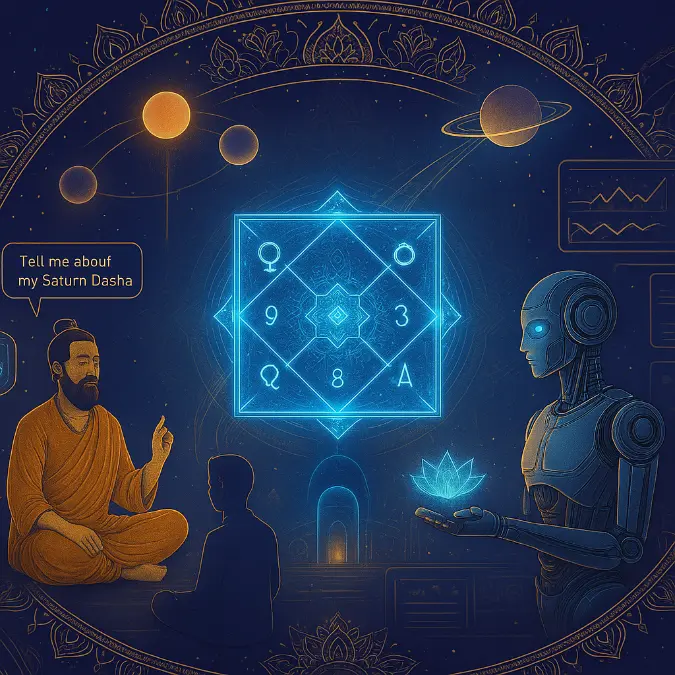
📊Future Trends & Predictions
1. Emotionally Aware Astrology
AI might analyze user sentiment—like journaling moods—and cross-reference with karmic cycles to offer tailored mental health suggestions.
2. Virtual Reality & Astro Meditation
Imagine VR temples offering immersive planetary alignment experiences combined with Jyotish insights before meditation.
3. Community Crowdsourced Karma Tracking
People may opt into sharing life event markers tied to planetary changes—creating communal AI models that refine accuracy over time.
4. Interdisciplinary Collaborations
Expect joint research between astrology scholars, data scientists, psychologists, and neuroscientists to validate patterns and chart credibility.
📚 Case Studies: When AI Astrological Warnings Succeeded—or Failed
Success Story: Avoiding Air Travel Mishap
In 2025, during a period marked by intense planetary retrogrades and a Rahu transit in Pisces, Paytm CEO Vijay Shekhar Sharma received an AI-driven alert warning him against air travel. He took the advice seriously and canceled a scheduled trip. That same week, several aviation incidents were reported, correlating eerily with the predicted timeline.
Quote: “The AI flagged my Saturn-forced delays—I postponed a meeting and avoided a sudden travel mishap.” — Anonymous professional user
This story showcases how AI tools can integrate planetary patterns with real-life decisions—especially when validated by traditional knowledge.
Mixed Outcomes: Health Forecast Confusion
A 32-year-old user of a popular Vedic-AI app received a health risk alert during a Mars-Ketu transit. The system advised Ayurvedic detox, chanting, and rest. She followed the guidance, though it later emerged that the app had miscalculated her Moon nakshatra due to a glitch in the ephemeris database. The user felt unnecessarily anxious, though ultimately unharmed.
This case reveals the importance of accuracy in backend data and reinforces that AI is still a work-in-progress—not divine gospel.
Cautionary Tale: Misleading Compatibility Score
An NRI couple used an AI-powered Kundli matching app that rated their compatibility at 92%. The report emphasized Guna Milan and omitted certain subtleties like Mangal Dosha and behavioral tendencies. After marriage, severe emotional incompatibilities emerged. They later consulted a human astrologer, who found critical 7th house afflictions and past-life karmic ties.
The couple realized that while AI offers a useful starting point, it lacks the soul-level insight that an experienced Jyotishi can provide. This underlines the risks of treating AI reports as final verdicts.
Takeaways
- AI can provide valuable alerts and pattern recognition when accurate.
- Errors in data inputs or calculations can cause harm or confusion.
- Human verification and common sense are essential complements to digital Jyotish.
- Use AI for support, not substitution.
❓ FAQs — AI in Astrology & Vedic Warnings
Conclusion: Empowered Destiny Through AI + Dharma
The fusion of AI and Vedic astrology is arguably the most significant spiritual tech revolution of our times. As rigid charts meet learning algorithms, we’re witnessing:
- Faster, data-driven insight into personal cycles.
- Accessible wisdom via devotional apps.
- Real-world warnings about health, travel and career.
Yet wisdom reminds us: astrology is not about predestination—it’s about preparedness. Whether powered by silicon or shastra, destiny shifts only through intent, action, and conscious surrender. May this merger of AI and Ancient Dharma empower seekers, protect pilgrims, and open doors of insight—while preserving the soul behind the chart.
Sign Up Zodinity to Explore more similar topic like Blue Full Moon in Aquarius – August 2025: Breakthroughs, Liberation & Emotional Clarity for All Zodiac Signs.
External Resources:
How AI Serves as a Digital Guru in Astrology and Devotional Apps – The Economic Times.
The Future of Astrology with AI: Enhancing Traditional Practices Without Replacing Them – The Economic Times.
AstroSage AI: India’s Spiritual Science Meets the Future of Tech – cxotoday.


